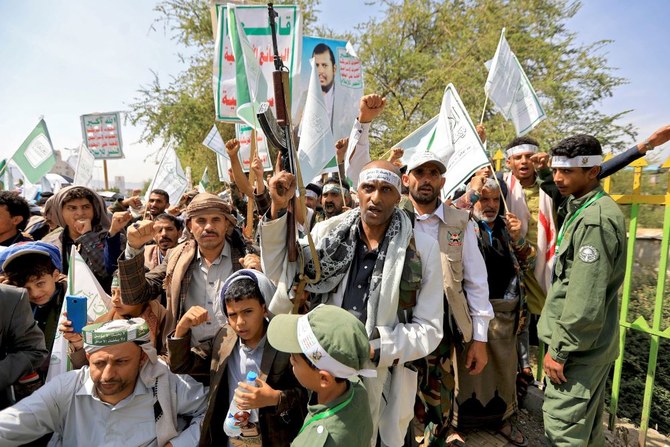AL-MUKALLA: A drone boat attack on a ship off Yemen’s Red Sea port of Hodeidah on Thursday is believed to be the latest in a series of assaults by the Houthi militia on commercial vessels in the major trading route.
The UK Maritime Trade Operations, or UKMTO, said it was informed of an incident 83 nautical miles southwest of Hodeidah, and asked ships operating in the Red Sea to exercise caution and report any suspicious activity.
“The nature of the attack is reported as a waterborne improvised explosive device,” the UKMTO said in its notice.
It did not elaborate, but the Houthis previously have used small explosive-laden drone boats to attack ships.
The UKMTO said the vessel and crew were reported safe, and the ship was proceeding to its next port of call.
Ambrey, a UK maritime security service, said that a commercial ship was struck by a projectile 84 nautical miles west of Hodeidah, with no reported casualties or damage, and that the ship was sailing to Dammam.
The Red Sea attack occurred a day after another commercial ship in the Gulf of Aden narrowly evaded a Houthi missile.
The militia did not claim responsibility for the two attacks.
However, a spokesperson, Yahya Sarea, claimed late on Wednesday that the Houthis and an Iraqi group launched a joint drone attack on a commercial ship, MSC Manzanillo, in the Israeli port of Haifa.
According to the maritime monitoring website marinetraffic.com, MSC Manzanillo is a Portuguese-flagged container ship.
Since November, the Houthis have seized a commercial ship, sunk two others, and launched hundreds of drones, ballistic missiles and sea drones at commercial and naval vessels in international shipping arteries, claiming their actions are in support of the Palestinian people against Israel’s war in Gaza.
This month, the Houthis increased their assaults, hitting a ship almost daily and sometimes making two announcements a day of fresh attacks.
The US Central Command said on Thursday that its forces had destroyed a radar facility in a Houthi-held region of Yemen during the previous 24 hours.
The US responded to the Houthis’ assaults by assembling marine task forces in the Red Sea, labeling the militia terrorists, and initiating strikes on Houthi sites in Yemen.
However, the Houthis claim that neither the strikes nor the terrorist designation have diminished their military capacity, and that they will cease assaults only if Israel ends its war in Gaza.
In a televised address on Thursday, Houthi leader Abdul Malik Al-Houthi boasted of employing more devastating weaponry in their assaults, including long-range missiles and explosive-laden drone boats, and claimed that US and British strikes had only strengthened the militia.
“The American and British hostility against our nation led to the further development of our military capabilities,” he said.
Meanwhile, the Aden-based central bank on Wednesday banned local exchange companies and banks from dealing with 12 unlicensed entities that provide wallets and electronic payment services in Houthi-held territories, including Wallet Electronic Riyal, Cash Wallet, and Yemen Wallet.
The central bank also suspended all internal transfer systems between local banks, exchange firms, and financial bodies, ordering financial institutions to use the Unified Network for Money, or UNMoney, which it controls, and allowing 15 days to halt pending transfers or face sanctions.
Economists believe the two actions target Houthi funding sources, while also giving the bank greater influence over on the country’s unstable currency markets.
“This move might be equally or more significant than relocating banks to Aden, as the Houthis rely heavily on informal transfer and exchange networks in areas under their control,” Mustafa Nasr, director of the Studies and Economic Media Center, told Arab News.
The central bank in Aden has recently sanctioned six Yemeni banks for failing to comply with its order to relocate from Houthi-held Sanaa to government-controlled Aden.


























